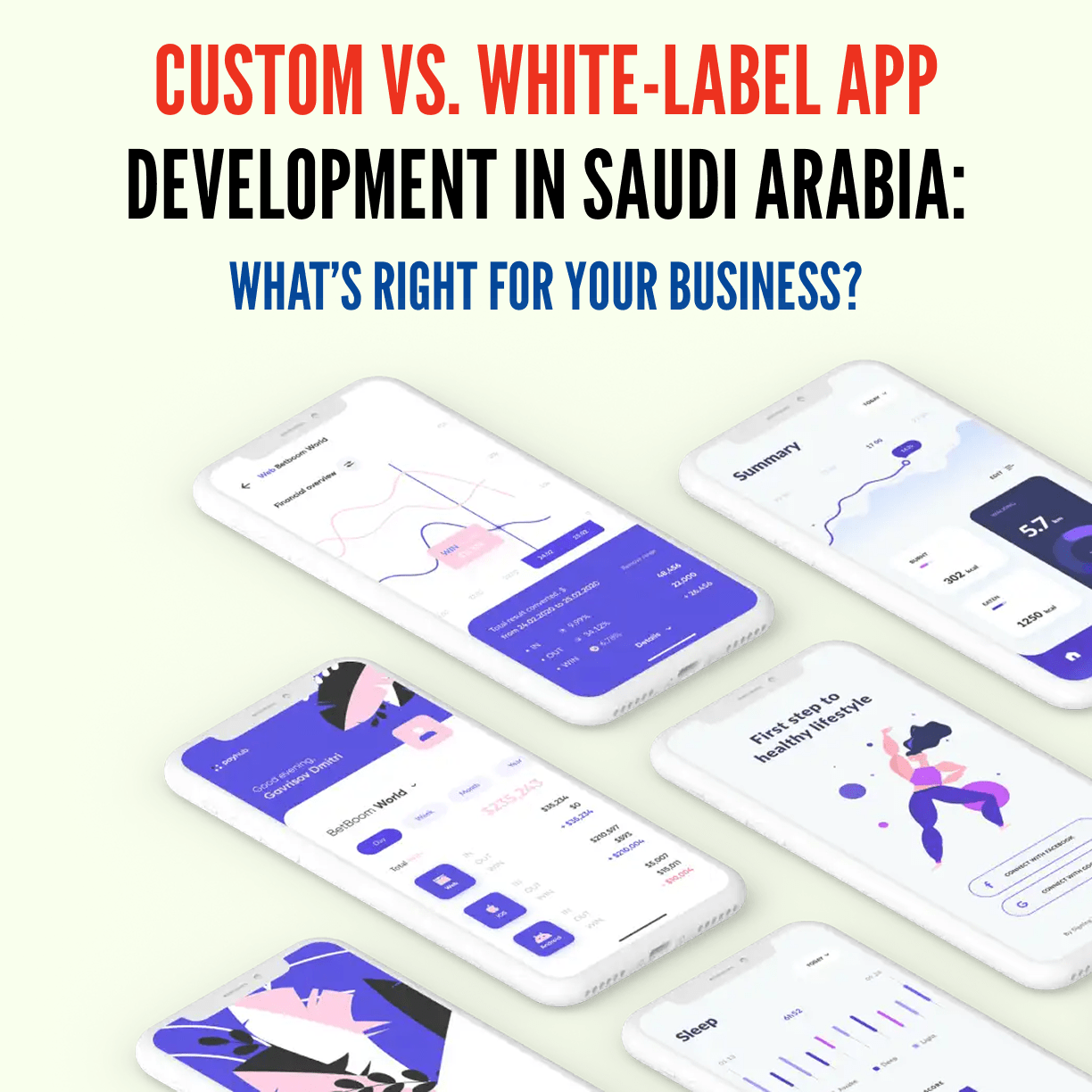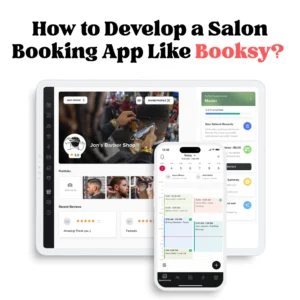|
Getting your Trinity Audio player ready...
|
Saudi Arabia is going through its largest digital transformation thanks to Vision 2030 and a national push for innovation and diversification. Mobility is shaping up to become the most widely adopted medium in the Kingdom. Thus, companies are beginning to see that building mobile applications is more about customer loyalty, operational efficiency, and scalability. Be it a startup in Riyadh trying to topple an obscure market or an established business spreading wings across the Gulf, the thought of how to build its app is staring at them more than ever.
Central to this decision is the critical choice of whether to invest in custom mobile app development services or to use white-label apps. There are strong arguments in favour of them both. Custom mobile app solutions in Saudi Arabia allow organisations to offer truly personal experiences by ensuring that every feature, design aspect, and workflow fits into their operating model. Companies in very controlled sectors such as finance, logistics, or healthcare find this level of control very tempting, where security, compliance, and sharing are number one priorities.
White-label app development in Saudi Arabia packs speed into its structure together with its bargain price. With templates ready to go in a matter of days with anything from branding to deployment, organisations can move faster to market, test new markets, and keep their costs down. For spirited startups willing to put forth their concepts and lure in investors, white-label mobile solutions in Saudi Arabia can constitute a tasteful entry point between cost and functionality.
The challenge for decision-makers goes beyond differentiation between these two models as to which an applicant company actually places best within the context of its stage of growth, resources, and long-term vision. In this blog, Esferasoft will take a close look at these two approaches, how they are influencing the Saudi business landscape, and how to choose the right mobile app development company in Saudi Arabia for your needs: fully custom, white-label, or hybrid.
The Saudi Arabian Mobile App Ecosystem
Saudi Arabia has turned itself into one of the most vibrant digital markets across the length and breadth of the Middle East. The Kingdom abounds with a young, tech-savvy generation, extremely high smartphone penetration, and unfaltering government support through Vision 2030. All these are creating fertile soil for mobile-first businesses. From e-commerce and fintech In logistics, healthtech, and entertainment, mobile apps are changing the way people work, live, and shop.
A Market Shaped by Vision 2030
Technology and innovation will have a pivotal role in the economic diversification agenda under Vision 2030. The intensity of initiatives like the Saudi National Digital Transformation Program has hastened the investment in infrastructure, cloud adoption, and mobile services. As a result, new startups and enterprise partnerships arise with a mobile application development company in Saudi Arabia to develop mobile applications and solutions that will meet local demand.
Growing Demand for Startup Solutions
The start-up scene is pretty fast-paced in the Kingdom and has emerged as a major hub for such ventures: Riyadh. These are witnessing flourishing sectors, including food delivery, ride-hailing, online retail, and on-demand services. In most early development cases, startup app development in Saudi Arabia down-pays white-label mobile solutions for reduced costs, faster market entry, and business model validation prior to scaling.
Enterprise Adoption of Custom Solutions
While startups are very much about speed, enterprises seek long-term value. Enterprises like banks, hospitals, logistics providers, and government agencies are seeing an increasing investment in enterprise mobile app development in Saudi Arabia. Companies often go for custom mobile app solutions, as it gives them more control over design, security, and scalability, and this is where custom apps have an edge over off-the-shelf solutions. The above-mentioned key requirements, among others, include bilingual interfaces (Arabic/English), compliance with regulations, and advanced analytics, which can only be satisfied by a bespoke build.
Riyadh: The Digital Development Hub
Riyadh, the capital city, is taking a position at the forefront of app development due to an ever-increasing number of agencies and firms. A mobile app development agency in Riyadh does not only hypothetically bear the technical capabilities but also conveys the understanding of the local markets—looking into consumer behaviour, cultural considerations, and legal frameworks. This local context makes it a hotbed for firms that are looking for the best marriage of innovation with cultural relevance at the same time.
The Push Toward Hybrid and Cross-Industry Apps
The shimmering trend that stands as the hallmark today is an increasing penchant for hybrid applications of different services brought together on a single platform. Super apps—to make payments, shop, and take care of different life aspects—are growing more popular under the dictation of the demand for convenience. This is where custom app development companies in Riyadh and the white-label ones are both striving to present scalable solutions so they can evolve into multi-service platforms.
What exactly is Custom Mobile App Development?
The custom mobile application development embodies the artistry of building an application from scratch as per the specific needs of a business. Unlike out-of-the-box or packaged solutions, custom apps are created considering the goals, workflow, and customer experience of the brand. The benefit is, therefore, the unique flexibility and control of this approach for businesses in Saudi Arabia that wish to differentiate themselves in a competitive market.
Key features of Custom Applications
- Tailored Features: All functions – from login through payment gateways – are developed according to your specific requirements. For instance, a retail brand in Jeddah might need tailored shopping recommendations integrated with Arabic-language support.
- Customised Branding: With a custom build, companies own all potential design and user experience drives, ensuring that the app reflects their brand identity without compromise.
- Scalability: Custom applications are growing together with their businesses. Features demanded by the user can be added or modified, so these applications become the best fit for a long-term-planned company.
Benefits of Custom Development
- Flexibility and innovation: Companies could have maximum leverage to apply even the most futuristic technologies like AI-sourced recommendations or IoT integration and AR to create experiences without all the binding restrictions caused by a template.
- Stronger Security: Most industries like finance, healthcare, and logistics in Saudi Arabia, adopted customised mobile applications with more than just compliance and advanced security protocols.
- Ownership & Control: Unlike the white-label apps where a vendor controls the framework, custom development confers complete ownership of the intellectual property to organisations.
Challenges to Consider
It is easy to think of custom mobile app development as very powerful in its capabilities. On the other hand, it takes time and investment – a few months – in the process from idea to testing up to deployment. Costs are also higher as compared to white-label mobile solutions in Saudi Arabia, and then continuous maintenance may need the allocation of an entire team or partnership with a mobile app development company in Saudi Arabia.
A Real-World Example
Imagine a healthcare provider based in Riyadh who wishes to digitise how it interacts with patients. Off-the-shelf or white-label apps cannot be compliant with the regulatory requirements related to the protection of medical data. That is exactly where mobile app custom development comes into play: the possibilities for building such mobile applications with unique features like secure online patient portals, Arabic-English bilingual support, integration with hospital records, and compliance that resembles HIPAA for the Saudi market.
When to Choose Custom Development
- Enterprises with long-term digital roadmaps would prefer to do it this way.
- Businesses in highly regulated industries require compliance.
- Companies that value innovation and a unique customer experience.
- Organisations looking to have complete control over future updates and scalability of their apps.
It’s not always about a single-pitch solution that aims to go to market fast. It’s about the perfect solution that is ready to grow with the business in the future. For enterprises based across Saudi Arabia, this path often represents a strategic investment into brand differentiation and long-term competitiveness.
What is White-Label App Development?
The white-label application development may also involve already developed applications or frameworks that are brandable with the company’s logo, colour scheme, and certain features for customisation. Instead of building applications from scratch, businesses would rather leverage the already developed solutions by specialised vendors. For many firms in Saudi Arabia – and especially startups and SMEs – therefore, this model brings costs down and gives rapid access to the market.
Major Features of White Label Apps
- Character Basic: Already existing in the application, it includes standard features like login, payment, product catalogues, or tracking of delivery.
- Rebranding: Businesses can tailor the interface according to their branding; hence, the app can represent their image, though without heavy development.
- Deployment Speed: Hence, the company can launch its application within weeks instead of months because the core is already there.
Advantages of White-Label Mobile Solutions
- Speed-to-Market: This is typically suitable for startups in Riyadh or Jeddah wanting to timely test an idea. For example, a food delivery app could be live within weeks using a white-label mobile solution in Saudi Arabia.
- Cost-Efficient: From the reduced development costs, businesses can have the budget preserved for marketing, scaling, or customer acquisition.
- Proven Functionality: Since these apps are popularly tested across different businesses, the possibility of occurrence of bugs or failure of functionalities is reduced.
Challenges to Consider
- Limited Flexibility: The businesses get what they can get as features from the white-label framework. To add unique functionalities, it can be complicated or impossible.
- Vendor dependency: Any update, maintenance, or scaling functions rely on the vendor’s roadmap, which is not always aligned with the business needs.
- Differentiate by: More than one company can be on the same base framework, though, thus it makes it difficult for them to distinguish themselves in such a crowded market as Saudi.
Practical Example
Using a startup in Riyadh, it wants to start an e-learning app. Building a custom app will be expensive and time-consuming. Instead, they might probably take up a white-label app development service in Saudi Arabia that allows them to rebrand an existing solution using their logo, modify the design for Arabic-speaking users, and go live quickly to capture early market share. Once established, they can later change into custom mobile app development services for advanced features.
When to Choose White-Label Development
- Startups trying to enter the market quickly with competitive leverage.
- Small businesses with very little money to spend but that very much need mobile visibility.
- Companies are testing new business models before going full throttle in development.
- Quick returns on investments often come from short-term fixes.
For many startups in Saudi Arabia, the white-label mobile solution is just an idea test, a user acquisition vehicle, and promises for future funding before switching to custom mobile application strategies for long-term growth.
Custom vs White-Label Applications: A Feature-by-Feature Differentiation

When it comes to finding custom mobile app solutions for Saudi Arabia or going for white-label app development, this boils down to a long list of trade-offs. Yes, both approaches could be worthwhile, but they differ distinctly in terms of costs, scalability, control, and long-term implications. Feature-by-feature comparison is the best way to go about helping businesses around the cities of Riyadh, Jeddah, and the Kingdom at large make sound decisions.
Comparison Table
| Criteria | Custom Mobile App Development | White-Label App Development |
| Cost | High upfront investment; tailored development, design, and integration. | Lower upfront cost; subscription or licensing fees may apply. |
| Time-to-Market | Longer (3–9 months depending on complexity). | Faster (2–8 weeks). |
| Scalability | Highly scalable; features can grow with the business. | Limited scalability; dependent on vendor’s platform and roadmap. |
| Branding Authority | A full-fledged control over UI/UX that can allow crafting a very unlike identity. | Minimal changes to branding elements, such as logo colours and UI modification. |
| Security & Compliance | More personalised for industries like banking, healthcare, and government. | Common security; not satisfying the strict compliance with the Saudi regulations.. |
| Ownership & IP | Full ownership of code and intellectual property. | Vendor retains ownership; the business licenses usage. |
| Maintenance and Support | Requires continuous collaboration with the mobile app development company in Saudi Arabia. | The vendor manages the updates, while the custom-change modification has very limited flexibility. |
| Innovation Potential | High: AI, IoT, AR, and bilingual support customisation for local users can all be integrated. | Moderate: Limited features and limited time frame given by the vendor. |
| Long-Term ROI | Strong ROI if in line with a business growth strategy. | Better short-term ROI; may need transition to custom later. |
Induction into the Startup Fraternity of Arabia
- White-Label Benefit: Startups are expected to test their concept, attract early adopters, and ramp up rapidly. They can launch at little cost through white-label apps, test the response from the market, and pivot very quickly without exposing themselves to a heavy financial risk.
- Where Tailored Shines Later: Once a startup gets funded or becomes buoyant, the company shifts allegiance to custom mobile app development services to build the extra features that will get them better compliance, as well as differentiate them from even those direct competitors.
Example: This start-up based in Riyadh that focuses on food delivery quickly gets off the ground without white-label mobile solutions. After attracting users and investor interest, it made the switch to a custom app development company in Saudi Arabia for features such as loyalty programmes, AI-driven delivery optimisation, and seamless Arabic–English UX.
For Enterprises in Saudi Arabia
- For Custom: Large firms like security and compliance; they, in fact, do not compromise with the above in any of their business operations, such as a bank in Jeddah or a logistics company in Riyadh. Enterprise mobile application development in Saudi Arabia essentially requires custom infrastructure, integration with its internal systems, and the ability to accommodate thousands of users at the same time.
- Problematic with White Label: Organisations that apply the white-label solutions do risk lock-in to their sources, limit innovations from competitors and put themselves in line with compliance issues in very tightly regulated industries.
Example: A customised solution for mobile applications in a health establishment in Riyadh would ensure that patient data confidentiality is kept intact, has the ability to be tied with hospital management systems, and will comply with standards set by Saudi health authorities.
The Middle Ground: Hybrid Approach
Some businesses choose a hybrid model, working with an app development agency in Riyadh for white-labelling to validate the idea and then progressively tailoring modules or moving onto a full custom solution with increasing size. This staged model works in the interim, whereby speed has been offset by long-term feasibility.
To give a short formulation of advice: it is not whether one model is better than another but which one is more suited to your current stage, budget, and goals. Startups typically do well with white-label apps, while enterprises with custom solutions, and some see a hybrid path that satisfies both needs.
Factors to Consider When Choosing
One isn’t just debating the features of choosing between custom mobile applications and white-label apps in Saudi Arabia. Each should align with the business model, industry, and ambitions for growth regarding the development. Competent factors that Saudi businesses should evaluate before collaborating with a mobile-app-development company in Saudi Arabia are given below:
1. The Budget and Stage of Financing
- Startups & SMEs: For startups and new ventures, limited budgets usually concur that white-label apps make more sense. It allows you to test the waters at less risk.
- Funded Startups and Enterprises: More money makes custom mobile app development services irresistible for ownership, scalability, and tailored design.
Tip: Treat white-label apps as a stepping stone, not the finish line.
2. Scalability Needs
- Immediate Growth: If the goal is mainly to acquire as many new users as quickly as possible, white-label apps can easily do all the essentials.
- Long-Term Growth: Custom mobile app solutions in Saudi Arabia are most sustainable for businesses anticipating thousands of users or those requiring multi-service capabilities (fintech super apps, enterprise logistics, or healthcare platforms).
3. Compliance and Security
There do exist strict data privacy laws and every conceivable regulatory framework concerning any business in the Kingdom of Saudi Arabia, more so in sensitive areas like banking, governmental services, and health care.
- Custom Applications: Enable advanced encryption, secure hosting, and customised compliance with local legal norms.
- White-Label Applications: Probably no adaptive flexibility to Saudi regulation.
Example: A Riyadh healthcare company, which cannot afford the risk of storing patient data outside the Kingdom. Most generic white-label vendors would have this problem.
4. Differentiation of Markets and White-Label Applications:
- White-Label: Fastest but compromises on design, similar to other companies using the same base framework.
- Custom Apps: They create a complete brand identity and a customised user experience, which is exactly what companies need in order to remain unique in the over-saturated digital market.
5. Time-to-Market
- Urgency: White-label mobile solutions in Saudi Arabia are ideal if the launch needs to happen within weeks – for example, during a seasonal campaign – or to seize a sudden market opportunity.
- Strategic Timeline: 6-12 months with an established roadmap can yield a better long-term ROI with custom development compared to white-label solutions.
6. Long-Term Business Objectives
- Short-term revenue goals: A white-label app can start generating revenues relatively quickly from delivery, booking, or e-commerce startups.
- Aligning with Vision 2030: Organisations that intend to drive Saudi Arabia’s digital economy through innovative and world-class solutions gain the most advantage from building enterprise mobile applications in Saudi Arabia to be custom-made from scratch.
7. Selecting the Right Development Partner
Custom-made or white label, everything depends on your technology partner. The app development company to consider engaging with should preferably be among the elite app development companies in Saudi Arabia or a competent app development agency in Riyadh if it is to include:
- A proven portfolio in various industries.
- Pricing clarity and total transparency.
- Strong post-implementation support.
- Possibility of app scaling as per increasing business size.
Bottom Line: The right notion balances present-day scenarios with future aspirations. White label flexibility may ideally benefit startups but for the better part, custom solutions are more valuable for enterprises or startups endowed with long-term funding. A reputable app development agency in Riyadh must act as a trusted intermediary along both paths, ensuring that you choose not just the right app but also the right future solutions.
Choosing the Right Partner to Develop Your App

Be it for building your own mobile application or opting for a white-label app development model, success in either case depends hugely on development partners. This trend exists across the developing digital economy in Saudi Arabia, where many agencies do not offer clients the same level of expertise. Hiring the right mobile app development company in Saudi Arabia ensures not only that your app will be launched successfully but that it keeps doing so as your business grows.
1. Industry Experience and Portfolio
A strong partner will showcase proven success in various industries. For example, a mobile app development agency in Riyadh that produces e-commerce, logistics, and healthcare apps can understand compliance, cultural nuances, and user expectations typical of the Saudi markets. Prior works also tell you if the company is more oriented towards startups or more towards enterprise mobile app development in Saudi Arabia.
2. Technical Competence
A right partner must have outstanding command of the latest technologies and frameworks, including native iOS/Android, cross-platform tools, and new innovations such as AI and IoT for application development. In case you choose custom mobile app development services, you may get information on how they can work with integrations and scalability and create the UX design concurrently in Arabic and English. For white-label mobile solutions in Saudi Arabia, check how much they allow you to customise.
3. Clear Pricing Models
Prominent firms provide obvious quotations that do not have obscure fees.
- Custom Development: Higher costs are involved since they’re made from scratch, from design to development to testing.
- White-Label Apps: Licensing or subscription fees may be present. These should be calculated for sustainability over the years.
Such costs will be well-outlined by any good app development firm found in Riyadh in order to avail you of appropriate decisions.
4. Post-Launch Support
Just the home page application is the beginning. Each would-be long-term success would need upgrades, bug fixes, security patches, and performance improvements. An expert mobile app development company in Saudi Arabia should offer maintenance packages tailored to your stage of growth.
5. Understanding of Local Market Needs
Saudi Arabia’s digital consumers harbour expectations unique only to the Arabic-first interfaces, requiring the compliance of local laws, as well as cultural considerations in UX. An agency sits somewhere between a local mobile app development agency in Riyadh and offshore providers, which means that your app will be effective both with end users and in meeting all regulatory requirements.
6. Flexibility Across Models
The best partners do not constrain you to one strategy—opting for custom mobile app development or white-label app development in Saudi Arabia so that you may decide which would suit your business goals. This means that your startup can be lean, using white-label at the outset and later upgrading to custom solutions with the same partner.
-Shaping Your Digital Future with the Right Choice
The choice of custom-built mobile application development services or white-label app development services in Saudi Arabia is no longer technical; it is strategic in the manner in which it determines how well your business will thrive in an increasingly digital economy. A new business can make it fast through white-label mobile solutions in Saudi Arabia for easy entry, while enterprises walk away with very long-term benefits from yet-to-be-lined custom mobile application solutions designed to serve scalability, compliance, and innovation functions.
On whichever of the options you are taking, though, the viability of success is all dependent on getting the right development partner along the way. This is where Esferasoft comes in as the one best solution. Being a premier mobile app development company with a global exposure but a strong understanding of the Saudi Arabian market, Esferasoft proffers solutions that suit the growth stage, be it a startup in Riyadh launching very fast or an enterprise seeking secure, future-ready technology.
With a proven history across all sectors and credibility that cuts across bringing innovation and psychology together, Esferasoft goes beyond coding. We operate as a strategic app development agency in Riyadh and beyond, helping businesses to build sustainability in digital growth aligned to Vision 2030.
Your business requires much more than an app. It deserves a partner that can shape its digital journey. With Esferasoft, you are not merely deciding between custom and white-label. You are designing a brighter, bolder future. To learn more, call now at +91 772-3000-038!
FAQ’S
1. What is the difference between custom and white-label app development?
Custom apps are built from scratch to suit specific needs, while white-label apps are pre-built solutions rebranded for quick deployment.
2. Which is cheaper: custom or white-label app development in Saudi Arabia?
White-label apps are significantly cheaper, starting from SAR 15,000, while custom apps begin at SAR 80,000 and go upwards.
3. How long does it take to build a custom app in Saudi Arabia?
Custom apps usually take 4 to 8 months depending on complexity, integrations, and feature sets.
4. Can I scale a white-label app later?
Yes, but white-label apps have limited scalability compared to custom-built solutions that are tailored for growth.
5. Which industries in KSA prefer white-label apps?
Industries like food delivery, taxis, and basic eCommerce often choose white-label apps for faster market entry.
6. Is it possible to localize a white-label app for Saudi users?
Yes, many white-label platforms support Arabic RTL layout and Saudi-specific integrations like SADAD or STC Pay.
7. Do I own the source code in white-label apps?
Usually no. Custom apps give you complete code ownership; white-label apps are licensed.
8. What’s better for startups in Saudi Arabia — custom or white-label?
Startups looking for fast and affordable launches often prefer white-label. Custom is ideal for innovation-driven ventures.
9. How much does a food delivery white-label app cost in KSA?
A basic food delivery white-label app starts from SAR 20,000–35,000 depending on features and UI customization.
10. Can I convert a white-label app to custom later?
You can transition, but it’s often more efficient to start fresh with custom development to avoid architectural limitations.
11. Are white-label apps compliant with Saudi data laws?
Some are; always ensure the vendor complies with local data privacy laws like SDAIA and ZATCA e-invoicing requirements.
12. Is AI integration possible in white-label apps in KSA?
Yes, but it’s more flexible and deeply integrated in custom app builds than in most white-label templates.



